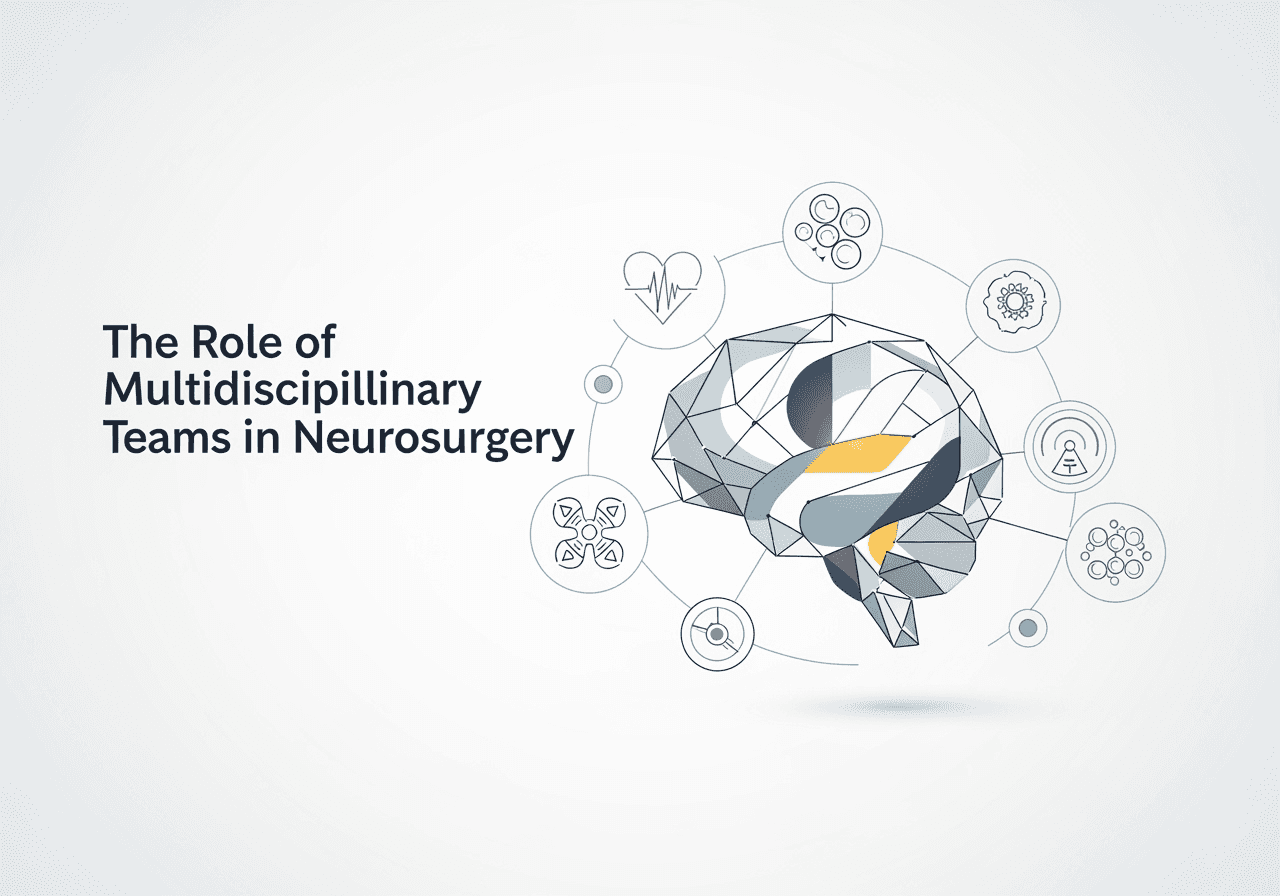
Role of Multidisciplinary Teams in Neuro Surgery
14 Oct, 2025
 Healthtrip
Healthtrip- < li>Where Multidisciplinary Teams Thrive in Neurosurgery
- The Critical Need for Collaboration: Why Multidisciplinary Teams are Essential in Neurosurgery
- The Core Team: Key Professionals in a Neurosurgical Multidisciplinary Team
- How Multidisciplinary Teams Function in Neurosurgery: A Step-by-Step Approach
- Successful Examples of Multidisciplinary Collaboration in Neurosurgery
- Hospitals Known for Multidisciplinary Neurosurgical Care
- Conclusion: The Future of Neurosurgery Lies in Collaborative Care
The Core of the Multidisciplinary Team
The strength of a multidisciplinary neurosurgery team lies in its diverse composition. Neurosurgeons, of course, are at the helm, wielding their expertise in surgical interventions. But alongside them stand neurologists, who are crucial for diagnosing and managing neurological conditions medically, often before or after surgery. Radiologists, armed with advanced imaging techniques like MRI and CT scans at hospitals such asSaudi German Hospital Cairo, Egypt, provide invaluable insights into the intricate structures of the brain and spine. Neuro-oncologists specialize in treating tumors of the nervous system, while pain management specialists focus on alleviating chronic pain, a common challenge for neurosurgical patients. Psychiatrists and psychologists provide emotional support, addressing the psychological impact of neurological conditions on patients and their families. Rehabilitation specialists, including physical therapists and occupational therapists working at Vejthani Hospital, Thailand, play a vital role in helping patients regain function and independence after surgery. This collaborative approach ensures that every facet of the patient's needs is met, leading to better outcomes and improved quality of life.Benefits of a Multidisciplinary Approach
The benefits of a multidisciplinary approach in neurosurgery are profound and far-reaching. Firstly, it leads to more accurate diagnoses. With multiple specialists reviewing patient cases, different perspectives are considered, reducing the risk of errors and ensuring that the correct diagnosis is reached promptly. Secondly, it enables more comprehensive treatment plans. By integrating the expertise of various specialists, treatment plans can be tailored to address all aspects of the patient's condition, from the physical to the emotional. For instance, a patient undergoing surgery at Hisar Intercontinental Hospital for a brain tumor might also receive chemotherapy from a neuro-oncologist, pain management from a specialist, and psychological support from a therapist, all coordinated by the neurosurgical team. This holistic approach maximizes the chances of successful treatment and improved outcomes, demonstrating that coordinated care is the best path to recovery. Healthtrip understands the power of this multi-faceted method, and is dedicated to assisting patients in finding the perfect facility for their needs.The Patient's Role in the Team
While the medical professionals form the core of the multidisciplinary team, the patient is undeniably the most important member. After all, it is the patient's health and well-being that is at the center of all decisions. Active patient involvement is crucial for the success of any treatment plan. Patients should feel empowered to ask questions, express their concerns, and actively participate in discussions about their care. Sharing personal experiences, preferences, and goals allows the team to tailor treatment to individual needs. For example, a patient recovering from spinal surgery at Fortis Hospital, Noida, might have specific goals for their rehabilitation, such as returning to a favorite sport or hobby. By communicating these goals to the team, the physical therapist can design a program that is both effective and motivating. Ultimately, a strong patient-provider partnership strengthens the entire team, fostering trust, improving adherence to treatment, and leading to better outcomes.Healthtrip's Commitment to Integrated Care
Healthtrip is committed to facilitating access to world-class neurosurgical care, emphasizing the importance of multidisciplinary teams. We understand that navigating the complexities of neurological conditions can be overwhelming, which is why we partner with leading hospitals around the world, such as National Cancer Centre Singapore and Quironsalud Hospital Toledo, that prioritize integrated care. Our platform provides comprehensive information about hospitals, specialists, and treatment options, empowering patients to make informed decisions about their health. We assist with every step of the journey, from connecting patients with the right specialists to coordinating travel and accommodation. Whether you are seeking minimally invasive surgery at LIV Hospital, Istanbul or comprehensive rehabilitation at Vejthani Hospital, Thailand, Healthtrip is your trusted partner, ensuring you receive the highest quality care from a team of dedicated experts. We believe that by fostering collaboration and prioritizing the patient's needs, we can pave the way for better outcomes and improved quality of life for individuals facing neurological challenges.Most popular procedures in India
Where Multidisciplinary Teams Thrive in Neurosurgery
Neurosurgery, a field demanding precision and expertise, has increasingly embraced the concept of multidisciplinary teams to address the complexities of neurological disorders. These teams flourish in environments that prioritize collaboration, communication, and a patient-centric approach. Picture a bustling hospital, not just filled with doctors, but with a symphony of specialists, each playing a vital role in orchestrating the best possible care for a patient facing a daunting neurological challenge. This collaborative spirit is particularly evident in comprehensive stroke centers, where rapid response and coordinated efforts are crucial to minimizing brain damage and improving patient outcomes. These centers often house dedicated teams of neurologists, neurosurgeons, radiologists, and rehabilitation specialists, all working in sync to provide immediate and effective treatment. Similarly, specialized brain tumor centers also champion multidisciplinary care, bringing together neuro-oncologists, radiation oncologists, pathologists, and neurosurgeons to develop personalized treatment plans tailored to the unique characteristics of each tumor. Think of it as a strategic huddle, where diverse perspectives converge to create the most effective game plan against a formidable opponent. For instance, facilities like Fortis Memorial Research Institute in Gurgaon showcase integrated approaches to cancer care, which naturally extends to neuro-oncology. Moreover, hospitals adopting cutting-edge technology, such as minimally invasive surgical techniques and advanced imaging modalities, also tend to foster a multidisciplinary environment, as these technologies require collaborative expertise to optimize their use and interpret their results. Healthtrip facilitates access to such advanced medical facilities, supporting patients in finding the best multidisciplinary teams for their specific needs. Ultimately, multidisciplinary teams thrive where a culture of shared decision-making, mutual respect, and a relentless focus on the patient's well-being reign supreme.
Wellness Treatments
Give yourself the time to relax
Lowest Prices Guaranteed!

Lowest Prices Guaranteed!
The Critical Need for Collaboration: Why Multidisciplinary Teams are Essential in Neurosurgery
Neurosurgery deals with the most intricate and delicate organ in the human body – the brain and spinal cord. The sheer complexity of neurological conditions necessitates a collaborative approach, making multidisciplinary teams not just beneficial but absolutely essential. Consider the case of a patient diagnosed with a brain aneurysm. The journey from diagnosis to treatment involves a cascade of critical decisions, each requiring specialized expertise. A neuroradiologist meticulously analyzes imaging scans to pinpoint the aneurysm's location and characteristics, while a neurosurgeon assesses the feasibility of surgical clipping or endovascular coiling. A critical care specialist manages the patient's vital signs and neurological status, and a rehabilitation therapist plans for post-operative recovery. Without seamless communication and coordination, critical information can be lost, leading to delays in treatment and potentially devastating consequences. Furthermore, multidisciplinary teams bring a diversity of perspectives to the table, fostering innovation and preventing tunnel vision. Each specialist brings unique knowledge and experience, allowing for a more comprehensive assessment of the patient's condition and the development of a more tailored treatment plan. Take, for example, the management of chronic pain. A pain specialist, a neurologist, a physical therapist, and a psychologist can work together to address the physical, neurological, and psychological aspects of pain, leading to more effective pain management strategies. Healthtrip recognizes the value of this collaborative approach and assists patients in identifying hospitals that champion multidisciplinary care. Facilities like Memorial Sisli Hospital in Istanbul exemplify the benefits of a coordinated approach by making quality care more accessible through their integrated teams. In essence, collaboration in neurosurgery transcends the limitations of individual expertise, creating a synergy that ultimately benefits the patient by providing more comprehensive, efficient, and effective care.
The Core Team: Key Professionals in a Neurosurgical Multidisciplinary Team
A neurosurgical multidisciplinary team is a carefully assembled group of professionals, each possessing unique skills and expertise, all working in concert to provide comprehensive patient care. At the heart of this team is the neurosurgeon, the surgical specialist responsible for performing operations on the brain, spinal cord, and peripheral nerves. They act as both a surgeon and a case manager ensuring cohesion across all disciplines. Closely collaborating with the neurosurgeon is the neurologist, a medical specialist who diagnoses and treats neurological disorders without surgery. The neurologist plays a crucial role in initial assessments, medical management, and long-term follow-up. Neuroradiologists, experts in interpreting medical images of the brain and spine, provide invaluable insights into the nature and extent of neurological conditions. Their ability to accurately diagnose and characterize abnormalities is essential for guiding treatment decisions. Critical care specialists are vital members of the team, particularly for patients undergoing complex neurosurgical procedures or experiencing acute neurological events. They provide intensive care monitoring and management, ensuring that patients receive optimal support during critical periods. Rehabilitation specialists, including physical therapists, occupational therapists, and speech therapists, play a crucial role in helping patients regain function and independence after neurological injury or surgery. They develop individualized rehabilitation plans tailored to each patient's specific needs. Beyond these core specialists, the team may also include neuro-oncologists (for patients with brain tumors), pain specialists (for patients with chronic pain), psychiatrists or psychologists (for addressing psychological aspects of neurological conditions), and specialized nurses who provide continuous patient care and education. Healthtrip understands the importance of these diverse skill sets and aims to connect patients with healthcare providers who prioritize a multidisciplinary approach. Hospitals such as Saudi German Hospital Cairo, Egypt, frequently emphasize integrated care teams. The strength of a multidisciplinary team lies not only in the individual expertise of its members but also in their ability to communicate effectively, share knowledge, and work together towards a common goal: the best possible outcome for the patient.
Also Read:
How Multidisciplinary Teams Function in Neurosurgery: A Step-by-Step Approach
The journey of a neurosurgical patient from diagnosis to recovery is often complex, requiring a carefully orchestrated series of interventions. Multidisciplinary teams streamline this process by fostering clear communication and shared decision-making. It typically begins with a comprehensive initial assessment. The patient's medical history, neurological examination, and imaging studies (like MRI or CT scans) are reviewed by the core team members. This collaborative review allows for a holistic understanding of the patient's condition, moving beyond isolated symptoms to identify the underlying cause and potential contributing factors. The discussion then delves into formulating a tailored treatment plan. This isn't a one-size-fits-all approach! The team considers various treatment options, weighing the benefits and risks of each in the context of the patient's overall health and preferences. For example, if a patient has a brain tumor, the team might discuss surgical resection, radiation therapy, chemotherapy, or a combination of these approaches. The patient's involvement is paramount during this stage. Their values, concerns, and goals are actively incorporated into the treatment plan, ensuring they feel empowered and informed about their care. This collaborative and transparent approach builds trust and enhances patient compliance, ultimately contributing to better outcomes. Regular team meetings are essential for monitoring the patient's progress and adjusting the treatment plan as needed. These meetings provide a forum for sharing updates, discussing challenges, and brainstorming solutions. It’s a dynamic process, constantly evolving to adapt to the patient’s changing needs and response to treatment.
SubSection on Importance of regular meetings
Imagine a neurosurgical patient undergoing rehabilitation after a stroke. The physiotherapy team shares updates on the patient's motor skills, while the speech therapist reports on their progress in regaining communication abilities. The neuropsychologist assesses cognitive function and provides strategies to address any deficits. This constant feedback loop allows the team to fine-tune the rehabilitation plan for maximum effectiveness. The neurosurgeon also plays a vital role in these meetings, providing insights into the surgical aspects of the case and offering guidance on potential complications. The combined expertise ensures the patient receives the most comprehensive and coordinated care possible. These multidisciplinary meetings often serve as a platform for continuous learning and improvement. Team members share their knowledge, discuss new research findings, and refine their clinical practices. This commitment to excellence ensures that patients receive the highest quality of neurosurgical care. And, should complications arise, the multidisciplinary team is poised to respond swiftly and effectively. They've already established a collaborative framework, enabling them to make informed decisions and coordinate interventions in a timely manner. This proactive approach can minimize the impact of complications and improve patient safety. Healthtrip facilitates seamless access to these integrated neurosurgical teams, connecting patients with world-class expertise and personalized care plans tailored to their unique needs, ensuring they receive the best possible outcomes on their journey to recovery.
Successful Examples of Multidisciplinary Collaboration in Neurosurgery
Consider the case of a patient diagnosed with a complex spinal cord tumor. Traditionally, such a case might involve a neurosurgeon operating in isolation, with limited input from other specialists. However, a multidisciplinary approach transforms this scenario. Before surgery, the neurosurgeon collaborates with a neuroradiologist to meticulously map the tumor's location and its relationship to critical neural structures. This detailed imaging guidance helps the surgeon plan the safest and most effective surgical approach. During the surgery, a neurophysiologist monitors the patient's spinal cord function in real-time, providing immediate feedback to the surgeon. This monitoring helps minimize the risk of neurological damage during tumor resection. Post-operatively, a rehabilitation specialist designs a personalized exercise program to help the patient regain strength and mobility. A pain management specialist addresses any post-operative pain, ensuring the patient's comfort and well-being. A psychologist provides emotional support and counseling, helping the patient cope with the challenges of recovery. This coordinated effort, involving multiple specialists working together, dramatically improves the patient's chances of a successful outcome. Another compelling example is the treatment of patients with traumatic brain injury (TBI). TBI is a complex condition that affects multiple aspects of a patient's health, from physical function to cognitive abilities and emotional well-being. A multidisciplinary team comprising neurosurgeons, neurologists, critical care physicians, neuropsychologists, speech therapists, occupational therapists, and physical therapists is crucial for optimizing outcomes in these patients. The neurosurgeon addresses any immediate life-threatening issues, such as bleeding or swelling in the brain. The neurologist manages seizures and other neurological complications. The critical care physician provides intensive medical support to stabilize the patient's vital signs. The neuropsychologist assesses cognitive function and develops strategies to address any deficits in memory, attention, or executive function. The speech therapist helps the patient regain communication abilities. The occupational therapist assists with activities of daily living, such as dressing and bathing. The physical therapist helps the patient regain strength and mobility.
SubSection on benefits of multidisciplinary teams
This comprehensive approach, addressing all aspects of the patient's needs, significantly improves their chances of recovery and helps them return to a fulfilling life. Multidisciplinary teams also play a critical role in the management of patients with chronic pain. Chronic pain can be debilitating, impacting a patient's physical, emotional, and social well-being. A multidisciplinary pain management team, including pain specialists, physical therapists, psychologists, and psychiatrists, can provide comprehensive care to these patients. The pain specialist diagnoses and treats the underlying causes of pain. The physical therapist helps the patient improve their strength and flexibility. The psychologist provides cognitive-behavioral therapy to help the patient manage their pain and improve their coping skills. The psychiatrist addresses any underlying mental health issues that may be contributing to the pain. Through Healthtrip, patients can connect with these high-functioning multidisciplinary teams, gaining access to the expertise and coordinated care necessary for complex neurosurgical conditions. This integrated approach not only leads to better clinical outcomes but also enhances the patient experience, making a significant difference in their overall well-being and journey to recovery. These examples vividly illustrate the power of multidisciplinary collaboration in neurosurgery. By bringing together diverse expertise and fostering seamless communication, these teams can deliver truly patient-centered care and achieve remarkable results.
Also Read:
Hospitals Known for Multidisciplinary Neurosurgical Care
When facing a neurosurgical challenge, choosing the right hospital is paramount. Institutions that prioritize multidisciplinary collaboration often stand out for their comprehensive and patient-centered approach. In Germany, Helios Klinikum Erfurt and Helios Emil von Behring are recognized for their integrated neurosurgical programs. These hospitals foster close collaboration between neurosurgeons, neurologists, radiologists, and rehabilitation specialists, ensuring patients benefit from a holistic and coordinated care plan. Their commitment to innovation and advanced technology further enhances their ability to provide cutting-edge treatments. Moving to Turkey, Memorial Sisli Hospital and LIV Hospital, Istanbul, are esteemed for their multidisciplinary neurosurgical teams. These hospitals bring together experts from various specialties to deliver personalized care for a wide range of neurological conditions. Their focus on patient education and support empowers individuals to actively participate in their treatment journey. In the United Arab Emirates, NMC Specialty Hospital, Al Nahda, Dubai, and NMC Royal Hospital, DIP, Dubai, are known for their comprehensive neurosurgical services and multidisciplinary approach. These hospitals boast state-of-the-art facilities and experienced teams dedicated to providing high-quality care for patients with complex neurological conditions. They provide seamless access to top-tier medical expertise, offering a convenient and reliable option for neurosurgical care.
SubSection for hospitals in other countries
Venturing further afield, Singapore General Hospital stands out for its internationally recognized neurosurgical program. The hospital’s commitment to research and innovation ensures that patients have access to the latest advancements in neurosurgical care. Its multidisciplinary team collaborates closely to develop individualized treatment plans tailored to each patient's unique needs. In Spain, Quironsalud Hospital Murcia and Jiménez Díaz Foundation University Hospital are respected for their multidisciplinary approach to neurosurgery. These hospitals offer a comprehensive range of services, from diagnosis to rehabilitation, with a strong emphasis on patient-centered care. Their commitment to continuous improvement ensures that patients receive the best possible outcomes. In Thailand, Bangkok Hospital, and Vejthani Hospital have established themselves as leading centers for neurosurgical care. These hospitals attract patients from around the world due to their advanced technology, experienced surgeons, and multidisciplinary approach. They provide a comfortable and supportive environment for patients undergoing complex neurosurgical procedures. Within the Healthtrip network, these hospitals represent a selection of institutions committed to multidisciplinary neurosurgical care. By choosing a hospital that emphasizes collaboration and integrated care, patients can increase their chances of a successful outcome and a smoother recovery.
Conclusion: The Future of Neurosurgery Lies in Collaborative Care
The landscape of neurosurgery is rapidly evolving, driven by technological advancements and a growing understanding of the complexities of the human brain and nervous system. As treatments become more sophisticated, the need for multidisciplinary collaboration becomes even more critical. The days of the lone neurosurgeon operating in isolation are fading into the past. The future of neurosurgery lies in collaborative care, where specialists from various disciplines work together seamlessly to provide the best possible outcomes for patients. This collaborative approach not only improves clinical outcomes but also enhances the patient experience, fostering trust, empowering individuals to participate actively in their care, and providing emotional support throughout the treatment journey. The benefits of multidisciplinary teams extend beyond the individual patient. They also contribute to the advancement of neurosurgical knowledge and practice. By sharing their expertise and insights, team members can identify new research questions, develop innovative treatment strategies, and improve the quality of care for all patients. Healthtrip is committed to facilitating access to multidisciplinary neurosurgical care. By connecting patients with leading hospitals and experienced specialists, Healthtrip empowers individuals to make informed decisions about their health and receive the best possible treatment. The future of neurosurgery is bright, and Healthtrip is proud to be a part of it, driving innovation, promoting collaboration, and ensuring that patients receive the compassionate and comprehensive care they deserve.
SubSection on Healthtrip mission
We envision a world where every patient has access to the expertise and coordinated care of a multidisciplinary neurosurgical team, regardless of their location or socioeconomic status. This vision drives our efforts to expand our network of partner hospitals, develop innovative telemedicine platforms, and provide educational resources to patients and healthcare professionals. As technology continues to advance, Healthtrip will leverage these advancements to further enhance multidisciplinary collaboration in neurosurgery. Telemedicine, for example, can enable specialists from different locations to collaborate remotely, providing expert consultations and guidance to patients in underserved areas. Artificial intelligence can assist with diagnosis and treatment planning, helping multidisciplinary teams make more informed decisions. Virtual reality can provide immersive training experiences for neurosurgical residents, preparing them to work effectively in collaborative environments. The journey to recovery from a neurosurgical condition can be challenging, but with the support of a multidisciplinary team and the resources of Healthtrip, patients can navigate this journey with confidence and hope. We are committed to providing personalized care, empowering individuals to take control of their health, and ensuring that they receive the best possible outcomes. The future of neurosurgery is collaborative, and Healthtrip is dedicated to making this future a reality for all patients.
Related Blogs

End-to-End Logistics for Cancer Treatment with Healthtrip's Support
Detailed guide on cancer treatment, featuring doctors, hospitals, risks, recovery,

Healthtrip's Care Coordinators: Your Support During Cancer Treatment
Detailed guide on cancer treatment, featuring doctors, hospitals, risks, recovery,

Healthtrip's Care Coordinators: Your Support During Cancer Treatment
Detailed guide on cancer treatment, featuring doctors, hospitals, risks, recovery,

Top 5 Indian Hospitals for Cancer Treatment
Detailed guide on cancer treatment, featuring doctors, hospitals, risks, recovery,

Post-Cancer Treatment Diet and Lifestyle Tips
Detailed guide on cancer treatment, featuring doctors, hospitals, risks, recovery,

Common Risks in Cancer Treatment and How Healthtrip Manages Them
Detailed guide on cancer treatment, featuring doctors, hospitals, risks, recovery,










